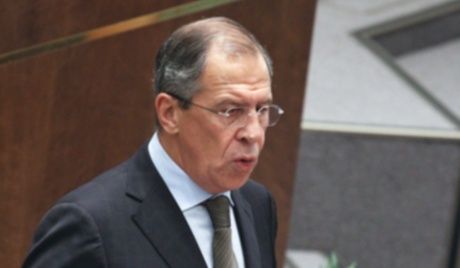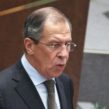
Kremlin Contemplates a Seismic Shift in Russian Foreign Policy
Publication: Eurasia Daily Monitor Volume: 7 Issue: 97
By:

Two conceptual strategy documents, one outlined in briefings by the Russian Foreign Minister, Sergei Lavrov, and another “leaked” to Newsweek in Moscow appear to indicate that a seismic shift in the country’s foreign policy is under consideration. If this is implemented more fully, it will mark the abandonment of an aspirational and reactive approach to the conduct of foreign policy and the assertive element encapsulated as “resurgent Russia.” Moreover, it explains the link between recent diplomatic successes that might otherwise seem unconnected ranging from its rapprochement with Poland to its border demarcation with Norway (Svobodnaya Pressa, May 13).
On May 13, Lavrov presented a report to the Federation Council on the country’s foreign policy priorities based on a set of theses first made public in January 2010 (On the Problems of International Legal Support for the Priority Avenues of Foreign Policy). Although part of his address lamented that the US ascribes greater importance to national legislation over its international agreements, he noted that this year Moscow’s emphasis had shifted. Among other issues he announced that Moscow would soon formalize the Russian border with Azerbaijan and expressed a nuanced approach to the Dalai Lama, though avoiding any suggestion that Tibet is viewed differently (www.gazeta.ru, May 14).
Newsweek, however, disclosed details of a restricted access document drafted by the Russian foreign ministry that had allegedly already gained provisional approval by President, Dmitry Medvedev. The “Program for the Effective Exploitation on A Systemic Basis of Foreign Policy Factors for the Purposes of the Long-Term Development of the Russian Federation,” elaborates a new foreign policy doctrine that is denoted by abandoning dividing foreign states into “friends” and “enemies” and tying the conduct of policy to pragmatic interests rooted in Medvedev’s aspiration to modernize the economy. As one high ranking Russian diplomat stated anonymously, it embodies “détente” (Russky Newsweek, May 9).
The document reportedly contains very ambitious goals, including the economic conquest of the Baltic States, buying up companies in Central Asia belonging to the former Soviet military industrial complex, pursuing nuclear power cooperation with African states and further strengthening ties with China and India. Outlining more than sixty countries with which to develop partnership relations, oddly making no mention of the UK, in its preamble Lavrov blames the global financial crisis on “the Western-centric system of global governance under the domination of the US” and claims that the West’s dominance in world politics and economics has “weakened.” However, he then offers a new approach, promoting “mutual dependency with leading world powers on the basis of the interpenetration of economies and cultures” as being in Moscow’s interests, before concluding that the EU and the US are its most “desirable partners” (Russky Newsweek, https://www.runewsweek.ru/country/34184/, May 11).
Underpinning this volte-face in foreign policy towards a more cooperative and self-interested approach, is the capital needed to modernize the Russian economy, which ultimately demands a search for foreign partners. Russia, since late 2008, has experienced a sharp decline in the influx of western capital that had hitherto allowed rapid growth for many companies, and with the increased levels in the cost of borrowing the Russian authorities have concluded that there is not enough money in Russia for a technological and modernization breakthrough. “The crisis has shown that Russia will not be able to develop independently –it is necessary to snuggle up to someone,” one Russian diplomat explained. “Snuggling up” to the EU will involve persuading Europe to heavily invest in Russian modernization (Russky Newsweek, May 11).
Within the former Soviet Union, the document prioritizes bilateral capital investment protection agreements with Azerbaijan, promoting Russian banks and considering support for Baku’s satellite program. In neighboring Armenia, Moscow will exploit the country’s experience of collaborative projects with NATO and the EU, and its potential to receive technological information from its western partners. In Belarus, capital and power engineering projects will receive priority combined with securing controlling blocks of shares for Russian companies in the Belarusian energy sector. In the Baltic States, Moscow will try to acquire the use of territory and transport infrastructure to transit goods to the EU, and will consider buying “enterprises in the real economy in the sphere of power engineering, information technologies, logistics, and transport” (Russky Newsweek, May 11).
In its relations with France, Moscow will target cross capitalization of Russian and French companies, pursue science and technology projects and support the participation of Thompson in the country’s transition to digital TV by 2015. Modernizing and developing nuclear power plants in other countries, including Bulgaria, will be complemented by deeper bilateral energy cooperation between Gazprom and Electricite de France. Similar objectives appear in cooperating with Germany, while mentioning political support for Nord Stream, conversion of the Airbus A320 into a goods carrier, designing and producing the Airbus A350. An effort will be made to expand cooperation between Russian railroads with Deutsche Bahn and Siemens to launch high-speed trains. Italian experience will be utilized in preparing the Sochi Winter Olympics in 2014, as well as reaching agreements on labor migration and involving its companies in modernizing Russian railroads, sea ports and airports. The Netherlands and Turkey also receive attention, though in the case of the latter Moscow wants to ensure that future trade is conducted using the ruble and Turkish lira (Russky Newsweek, May 11).
Problems are anticipated in affecting such a foreign policy shift, mainly linked to overcoming the difficulties in coordinating the efforts of business, the government and the foreign ministry. There is also the thorny issue that Prime Minister, Vladimir Putin, has a group of foreign policy aides managed by Yuriy Ushakov functioning as a “little” foreign ministry: which represents the single greatest barrier to adopting such policy concepts (Ezhednevny Zhurnal, May 14). It will also involve the coordination of the energy ministry and the ministry of industry and trade. One option being considered by the Kremlin is to give the foreign ministry new powers and to grant the government regulatory powers to implement these plans via a special directive. However, if this draft planning document becomes government policy, it would mark the end of “resurgent Russia” and usher in an era in the conduct of Russian foreign policy that will be less rooted in rhetoric and aspiration.<iframe src=’https://www.jamestown.org/jamestown.org/inner_menu.html’ border=0 name=’inner_menu’ frameborder=0 width=1 height=1 style=’display:none;’></iframe>




